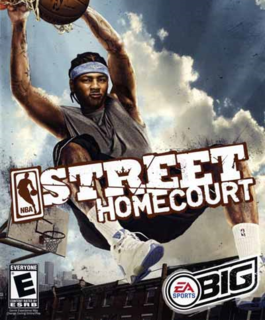With its somewhat simplified gameplay and glaring lack of features, Homecourt is a bit of a disappointment.
Like all the games in the Street series, Homecourt puts you in control of a three-person team on a street basketball court, and the gameplay here is still tight and enjoyable, though not quite as deep as in the last Street game. In addition to all the standard basketball elements of passing, shooting, stealing and the like, here you're encouraged to pull off flashy trick moves to fill up your gamebreaker meter. Activating your gamebreaker deducts a point from your opponents and lets you pull off some extra-flashy moves for more points than you can score otherwise. The trick stick of the previous Street game is gone and here you'll perform trick moves by pushing the X and Y buttons, modifying the movies with the left and right bumpers. Performing tricks in this way feels a bit more random and disconnected than it was previously, and it certainly makes the overall game feel a bit more simplistic.
There are a few new gameplay elements in Homecourt. For one, teammates will occasionally kneel down near the basket when you've got the ball, providing a platform for you to jump off of and go for a high-flying dunk. The biggest addition in Homecourt is the double dunk, a move which allows you to score two points on a dunk (more on gamebreakers) by dunking the ball, bringing it back above the basket through a feat of superhuman physical prowess, and dunking it again. It's a pretty great concept and the dunks themselves look great, though the dunk meter makes them perhaps a bit too easy to perform. In fact, the game overall is very easy on the easy and normal difficulty settings, though setting the game to hard or expert makes the dunk meter disappear, requiring you to rely on your own sense of timing, and makes the opposing team considerably more aggressive. You can jump into pick-up games, gamebreaker battles or games that do away with tricks and gamebreakers, but the heart of Homecourt is the homecourt challenge mode, in which you create a baller of your own and guide him to the top of the streetball world. This mode is also where it becomes obvious just how much is missing from this game. You start by creating a baller, but your options here are pretty limited. For starters, you can't create a female baller, though it's not as if there aren't any in the game. You'll play against Diana Taurasi, Sheryl Swoopes, Lisa Leslie and the like. What's more, you don't have that much control over what your baller looks like. Rather than letting you design the dude's features, the game morphs together three heads, a generic one and the heads of two NBA stars, to create your player's look. You can choose the three heads that get merged into one, but that's as far as your control goes.
From there, you're put onto your own homecourt to take on some challengers, and again, you have no control over the look of your court. In a particularly goofy touch, there's even a big H (as in Homecourt) in the center of the court, and you start off wearing jerseys with this same H on them, though if you're more comfortable shilling for soft drinks, you can sport Sprite gear from the start as well. Considering how much control the last street game gave you over the look of your baller and your homecourt, it's hard not to be somewhat disappointed by the lack of control you have here.
As you progress through the homecourt challenge mode, you'll face better players and recruit better players to your team. You will also improve your skills based on how much you use them, and on a few occasions you're given the option to choose a skill to max out. Playing through the homecourt challenge, taking your baller from small-timer to streetball superstar, can be done in a matter of hours, which also speaks to the game's lack of content.
Aside from this, you can also take the game online, though here too, a more robust feature set would have been nice. Games are always one player against another, so there's no options for teaming up with some friends. You're given the standard game types to play--pick-up games, gamebreaker battles and so on--and after each game you're automatically kicked back out to the main online menu, meaning that if you want to keep playing with your friend, a new game needs to be set up and joined each time. The presentation in Homecourt is quite good. The courts are particularly attractive, most of them vivid recreations of actual places like the courts of Venice Beach or Carmelo Anthony's homecourt of Cloverdale. The players themselves animate really well and look fine from a distance, though when the camera pulls in close on a player it often appears as if his eyes have rolled up into his head. The sound is pretty good overall, as well. An upbeat, old-school funk soundtrack gives the game a terrific summery vibe. This game does away with the announcer of earlier games, so all you hear is the sound of the game itself, along with chatter amongst the players, which is great for the most part, though a few of the taunts pop up a bit too often. (If that one dude says "Off your eyeballs!" one more time I'm gonna punch him in the face!) If all you're looking for is a game of street ball with some great on-court action, Homecourt delivers that. It plays tight, flows nicely and looks terrific. But if you enjoyed the depth offered by the gameplay and features of the last outing in this series, you may be disappointed to find that so much of that is missing from this one.

